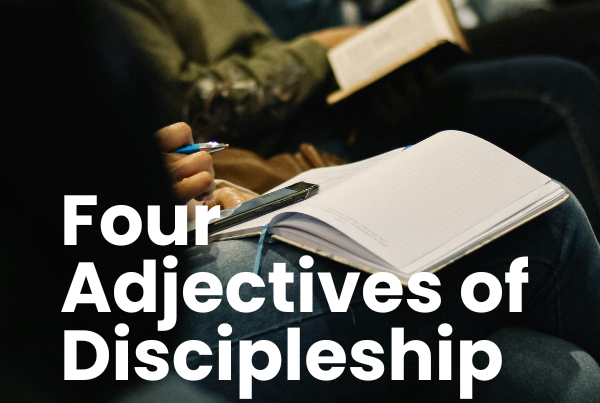
Throughout John’s biography of Jesus, a clear theme emerges: “Who is this guy?”
The answer comes in the form of the famous “I Am” statements. Jesus describes himself in imagistic terms to be “the bread of life … the resurrection and the life … the light.” In each of these ontological statements, Jesus employs the important Greek phrase ego eimi, “I am,” which hearkens back to the story of Moses and his interaction with YHWH, the I am (Exod. 3). And in case anyone is confused as to whether Jesus means to make such a blasphemous claim, he later boldly declares that “before Abraham was, I Am.” These statements of identity clue us in to who Jesus is—he is life. He is nourishment. He is God.
Skilled scholars have numbered the “I Am” statements to seven. But careful readers will notice that there are more than seven, far more. And one of them has lacked the attention that it deserves.
In John 13, after having washed his disciples’ feet, Jesus says, “You call me Teacher and Lord, and you are right, for so I am” (v. 13).
This 8th (12th?) I Am statement—again employing ego eimi—misses our count because, for one, it’s not imagistic like “bread” or “light.” Secondly, it’s not a unique claim. Of course Jesus is a teacher; everyone called him “Teacher.” Unlike the other statements, saying he’s a “teacher” doesn’t highlight Jesus’ deity.
Or does it? After all, Israel has many teachers, but the main one, the teacher, is YHWH himself. As the Psalmist says, “Make me to know your ways, O YHWH; teach me your paths. Lead me in your truth and teach me, for you are the God of my salvation; for you I wait all the day long” (Ps. 25:4-5). By claiming the moniker of “teacher,” Jesus is certainly aligning himself with God, the great instructor of sinners (Ps. 25:8).
Consider Jesus’ appearance to Mary after the resurrection. At first, she doesn’t recognize him, thinking him to be one of the gardeners. But after he says her name, she realizes who he is: “Rabboni, which in Aramaic means teacher” (John 20:16). Central to Jesus’ identity, just as important as his being the resurrection or the good shepherd or the vine, is his being our teacher.
Learning What To Do Next
Today, many Christians have a form of Christianity in which Jesus is their savior, perhaps even their “lord.” But he is not their teacher—that is, he doesn’t tell them what to do, guide them through life, or correct them when wrong. The commands of Jesus are not taken seriously, nor are they required for belief. No, that would be “works,” or worse, “legalism.”
There’s a history to this. The Protestant Reformation rightly placed the locus of salvation with God himself. Man cannot save; only God can. But one of the caricatures of Protestant preaching today is that “you don’t need to do anything to be saved … Jesus has done it all.” The result is an entire generation of Christians who prayed a prayer of faith alone but who didn’t learn what to do next.
The Bible doesn’t commend this approach. When the listeners asked Peter, “What must we do to be saved?” he didn’t say, “Nothing! Jesus did it all! Isn’t that great news?” No, he said, “Repent and be baptized …” and then they “devoted themselves to the apostles’ teaching” (Acts 2:38-42). In other words, change your beliefs and allegiances, give up living for yourself, join God’s family, receive his forgiveness, and start following the commands of Jesus.
Doing What We Have Learned
This is why the apostles can so easily move between talking about God’s grace and mercy and forgiveness to talking about our obedience and response, and obedience and works. To the apostles, these things were not separable into tidy categories like “justification” and “sanctification.” No, it is all the work of God. Even me learning to obey his teachings is his work, because after all, he’s the teacher!
In the passage from John 13 cited above, Jesus goes on to say, “If I then, your Lord and Teacher, have washed your feet, you also ought to wash one another’s feet” (John 13:14). His point is that real “faith” looks like obedience to his teachings. If Jesus is not our teacher, then he’s not really our lord at all; and he’s likely not our savior. Or as Dietrich Bonhoeffer says, “Only the obedient truly believe … and only the believing truly obey.”
The Blessing Inherent in Both
If we don’t regard Jesus’ primary identity as our teacher, we will miss out on perhaps the most significant part of his relationship to us. Jesus came to seek and save, to die on the cross for sins, to grant forgiveness, and to give eternal life.
He also came to instruct us in how we should live. That’s what a teacher—or in the Jewish context, a Rabbi—does. He forms a community of followers who learn how God designed them to live.
Living in the Way of Jesus is right, deeply satisfying, and so natural. More than ever before, in a world as confusing and constantly changing as ours, with so many voices to listen to—we need to recover a vision of Jesus as our teacher. Because, like the vine, the bread, and the life, that’s who he is.










